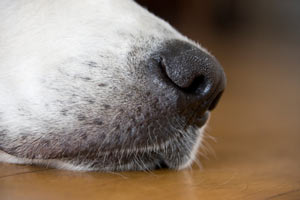Why Do Dogs Have Whiskers?

Most dogs have whiskers. They vary in appearance based on breed and individual genetics. Anyone with dogs is probably familiar with the prominent whiskers on their muzzles, but did you know that dogs also have whiskers above their eyes, on their chins, and above their upper lips?
Compared to ordinary hairs, whiskers:
- Are coarser.
- Are twice as thick.
- Have roots that are set three times deeper.
- Are much more sensitive, because their follicles are packed with nerves—they're more like your fingertips than they are like hair.
Although dogs are renowned for their superior senses of smell and hearing, whiskers play a role in helping them respond to their environment as well. They send a constant stream of data about their surroundings to their brains.
A dog's whiskers can detect faint vibrations (in fact the scientific name for whiskers is vibrissae) and minute shifts in air currents. This helps them determine the presence, size, shape, and motion of objects in their vicinity. That's particularly useful in the dark. Think back to the wild: that object could be prey—or a predator. In their safe indoor homes, dogs might use their whiskers to help them find their water bowls or favorite toys at night.
Whiskers also help protect dogs. If a speck of dirt, a thorn, or other foreign body touches their whiskers, they're likely to blink or shake their faces and avoid injury.
Some dog breeds use whiskers to determine whether they can fit through a narrow passage or poke their heads into holes.
A dog's whiskers are also powerfully useful in communicating. If a dog feels threatened, you will often see his whiskers fan out, then point forward.
Because their whiskers are so sensitive, when you touch them, do so delicately and with the grain. Don't trim or pluck your dog's whiskers because it may cause your dog confusion and decreased awareness of his surroundings.
Whiskers can be involved in some of the same diseases that affect a dog's skin and coat. The good thing about that is that a veterinarian can use standard dermatological methods to diagnose the problem and restore the whiskers to good health.
You May Also Like These Articles:
Why Do Dogs Tilt Their Heads When You Talk?
Foods Toxic to Dogs - Slideshow
Are Dogs Ticklish? Why Do Dogs Kick Their Leg When You Rub or Scratch Them?
Does a Dry Nose Mean My Dog is Sick?
Dog Park Preparation Tips - Slideshow
Disclaimer: This website is not intended to replace professional consultation, diagnosis, or treatment by a licensed veterinarian. If you require any veterinary related advice, contact your veterinarian promptly. Information at DogHealth.com is exclusively of a general reference nature. Do not disregard veterinary advice or delay treatment as a result of accessing information at this site. Just Answer is an external service not affiliated with DogHealth.com.

